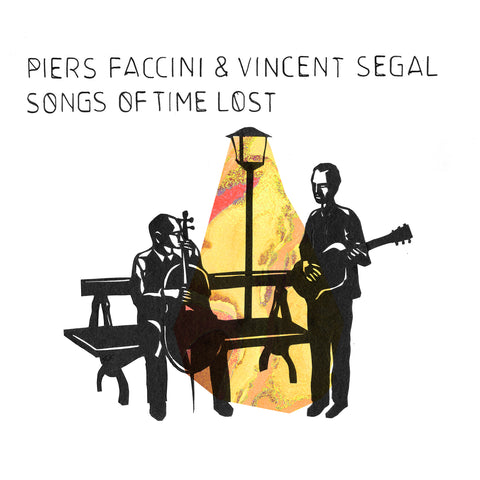Executive production by Laurent Bizot & Thibaut Mullings
Artwork : Piers Faccini
Design : Element-s
Photo : Payram
All tracks recorded by Philippe Teissier du Cros in the Cévennes (France), from august 16th to 19th 2013 at Antoine and Maries Mas des Sources, at le Prieuré St-Martin de Cézas and in the cave vinicole du domaine de Cauviac.
Mixed by Philippe Teissier du Cros at boxson studio, Paris, in october 2013
Mastered by Raphael Jonin at studio j raph i.n.g, paris on december 19th 2013
Piers Faccini : voice and guitar
Vincent Segal : cello
Songs 2, 4, 7 and 11 published by no format! and beating drum
Piers and Vincent would like to thank René Lacaille, Loy Ehrlich, Antoine and Marie Dalbard, Nicolas and Béatrice Walcker, association Asphodèle Le Prieuré.
Piers Faccini and Vincent Segal met in Paris in the late 1980s and have been friends ever since. Songs of Time Lost is their first joint album. Using voice, guitar and cello-andin a variety of languages from English to Neapolitan dialect and Creole-the album brings together original compositions, traditional songs and some covers. “It feels like a reunion”, says Vincent Segal, “even though we never really lost touch over the years.”
At the time of their original meeting, Piers Faccini was a painter and student at the Paris Beaux-Arts. Vincent had just left the Conservatoire. He was immediately taken by Piers’ vocals: “I wanted to find ways to support his voice, to envelop his words.” Piers later went on to launch his first solo album in 2004, Leave No Trace, which was produced by Vincent Segal himself. Piers’ work as a solo artist began. Meanwhile Vincent started to develop Bumcello and a myriad of other projects. The two musicians constantly kept in touch and would meet to play together when Piers was passing through Paris or Vincent was performing in London.
“I still like hooking up with Piers in the same way as when we first met,” Vincent says, “like when we used to play in my tiny apartment in Paris or right on the street. We always had to invent something there and then. We knew what was required. Our repertoire was limited, but it was different and unusual, anything from Muddy Waters, to Fela Kuti and Kodály. Songs of Time Lost is like a direct echo of those early days playing together on street corners in Paris, at the entrance of underground stations. »
Why did the two musicians wait twenty-five years? Piers and Vincent are great believers in things taking the time they need. And it takes time to make sense of the world’s music, to refine performance, to absorb the complexity of songs. This all the more evident in this album as the duo are revisiting the very songs which originally brought them together. “Reprising music and songs that we love”, Piers Faccini explains, “is a way for us to see how we can do them justice, with honesty and precision. You have to adapt to them, mould them to yourself, like an item of clothing or a shoe. And for that you need time, a lot of time. If you try and run too fast then you’re probably going to fall flat.”
Why did the two musicians wait twenty-five years? Piers and Vincent are great believers in things taking the time they need. And it takes time to make sense of the world’s music, to refine performance, to absorb the complexity of songs. This all the more evident in this album as the duo are revisiting the very songs which originally brought them together. “Reprising music and songs that we love”, Piers Faccini explains, “is a way for us to see how we can do them justice, with honesty and precision. You have to adapt to them, mould them to yourself, like an item of clothing or a shoe. And for that you need time, a lot of time. If you try and run too fast then you’re probably going to fall flat.” There is the Blues that Piers first heard from Mississipi John Hurt (Make Me a Pallet on your Floor), a composition by Alain Peters from the island of La Réunion (Mangé Pou le Coeur), a country valse by Townes van Zandt (Quicksilver Daydreams of Maria) and an instrumental theme by the Berlin composer Friedrich Hollander (Wenn Ich mir was Wünschen dürfte). There are also the melodies of the traditional Neapolitan repertoire which are favourites of Anglo-Italian Piers Faccini (Jesce Sole, Villanella, Dicitencela Vuje, Ciccerenella and the contemporary Cammina Cammina by Pino Daniele)
Of course, both musicians draw from their own repertoires for the album, too. This includes two songs from 1996 written by Piers Faccini for the soundtrack of a film. The soundtrack was the musicians’ first official collaboration as a duo. Thanks to it we have the song A Half of Meand the piece The Closing of Our Eyes for which Piers Faccini wrote lyrics seventeen years later. There are also two recent compositions by Vincent Segal, Cradle to the Grave and Everyday Away from You to which Piers added lyrics. The first has a New-Orleans-style riff that perhaps wouldn’t feel out of place on an old Alain Toussaint record and the other seems to conjure up the soft refrains of the Brazilian guitarist Luiz Bonfa. In short, the album is a fine balance between inspiration and influence. Itis the meeting point of the music one inherits from the great masters and the music one writes oneself.
Whoever has seen and heard Piers Faccini and Vincent Segal perform on stage knows that theirs in an honest and natural craft, whittled down to its bare essentials with no excess decoration or trickery. The album is mostly made up of first takes with no overdubs, recorded in three different places in the Cevennes: a family home, a cellar on a wine estate and a Romanesque chapel hidden away in the forest. Three locations and moments which, far from creating any disjointedness, tell a complete story and reinforce the sense of one free flow of music, which transcends time and place. This straightforward and organic approach is not how most albums are created these days, but this is how Piers and Vincent work. Songs of Time Lost is focused on the moment, but with over two decades of joint performances, friendship and mutual understanding behind it, binding the whole together.




